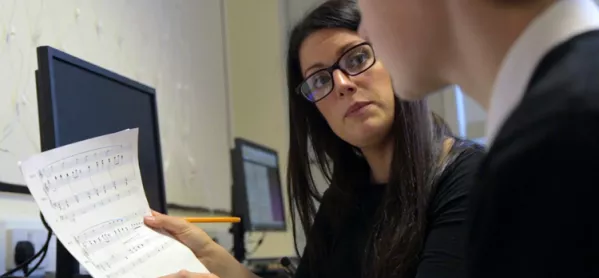There is no doubt that music education is good for pupils. In a recent TES article, classical pianist Lang Lang claimed that learning to play an instrument can help young people to develop logic, commitment and focus.
But school music should be about more than just reaching Grade 4 in the violin. It should also provide opportunities to be creative and for pupils to let their imaginations run wild by composing their own scores.
So, how can you take the school band to another level and get students composing? My school has been able to work with a professional ensemble as part of Glasgow’s New Music Makers programme, but any teacher can encourage young musicians.
Here are my tips:
- Perform live music
Hearing and seeing musicians perform live is a great source of inspiration for budding composers. Find out if a local ensemble, like Red Note Ensemble, would be willing to perform at your school. Or, if you have music instructors on your teaching staff, get them to play a few numbers for a school assembly.
- Lose the fear
Sometimes, knowing where to start is the hardest part. For a fear-free exercise that will give pupils something to work with, set a countdown timer for ten minutes and ask pupils to produce a composition in this time. Trying to compose under the time pressure will get rid of the fear and force pupils to just get cracking.
- Provide context
A bit of creative stimulus can really help pupils to focus when they are composing. Our pupils imagined fairy tales and wrote the stories down before creating works of elfin music that were performed live on BBC Scotland. But you could base a composition task around any scenario. How about asking pupils to produce the soundtrack for a charity advert or to arrange a piece for the school band to perform at Christmas time?
- Take it seriously
At school, it doesn’t matter whether a composition is any good or not. What matters is that we take pupils’ work seriously. Motivate young composers by asking meaningful and relevant questions about what they have produced. Treat pupils’ compositions as legitimate pieces of music, even if they are still a long way from the Albert Hall.
- Celebrate musicianship
Make sure that you shout about the work of the musicians and composers in your school. Publish their works, put them on the school website, make a CD for everyone in the class, play their pieces at parents’ evening. By making music visible, you make it something that more young people will want to participate in.
Isabel Horning (pictured) is principal teacher of performing arts at King’s Park Secondary in Glasgow.
King’s Park partnered with Red Note Ensemble for the New Music Makers initiative, which seeks to inspire and support composing with young people in schools.
Photo by: Daniel G. Fresneda
Want to keep up with the latest education news and opinion? Follow TES on Twitter and like TES on Facebook

